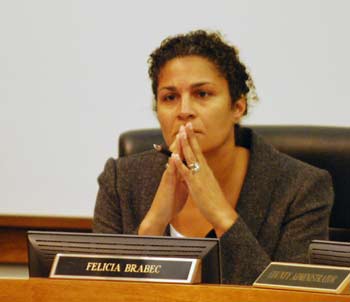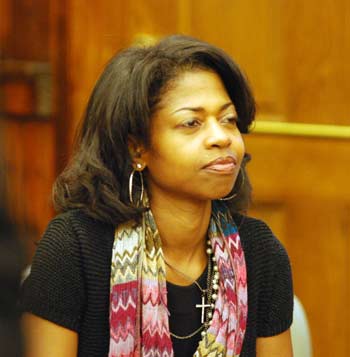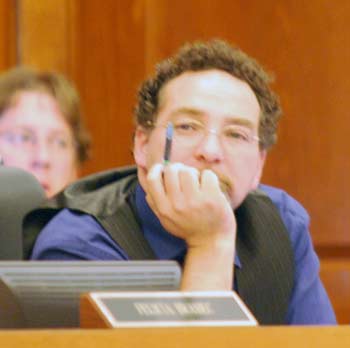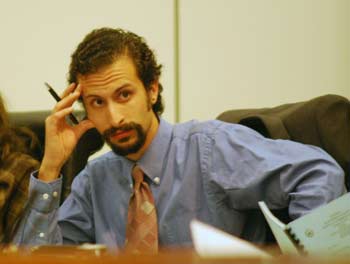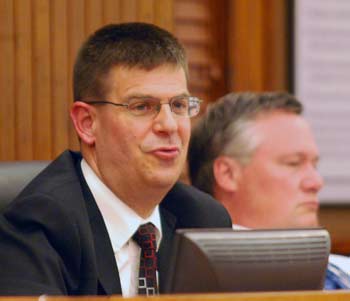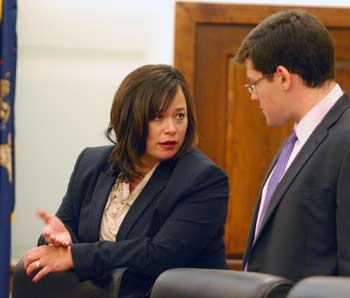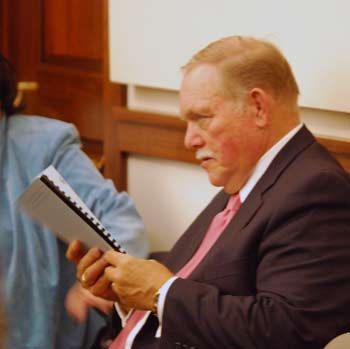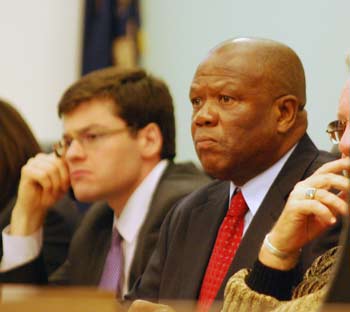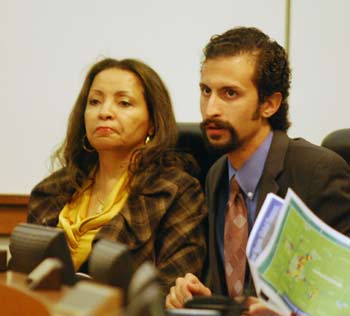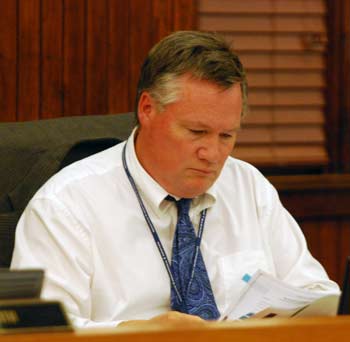County Board Debates Taxes, State Laws
Washtenaw County board of commissioners meeting (Oct. 16, 2013): A packed agenda and extensive public commentary resulted in a meeting lasting over six hours, with the majority of discussion focused on three issues: (1) the state’s Stand Your Ground law; (2) an increase to the Act 88 tax, and questions about the legality of such a levy; and (3) the county’s participation in a Pittsfield Township corridor improvement authority for State Street.

A supporter of Michigan’s Stand Your Ground law brought his gun to the Oct. 16 meeting of the Washtenaw County board of commissioners. (Photos by the writer.)
About three dozen people spoke to the board about the Stand Your Ground resolution, which urged the state legislature to repeal that law. Although there were speakers on both sides of the issue, more than 20 voiced opposition to the resolution, including several who attended the meeting wearing sidearms.
It was after midnight when the board took a 5-to-4 vote to pass the resolution, over dissent from Kent Martinez-Kratz (D-District 1), Dan Smith (R-District 2), Alicia Ping (R-District 3), and Rolland Sizemore Jr. (D-District 5). In support of the resolution were Felicia Brabec (D-District 4), Ronnie Peterson (D-District 6), Andy LaBarre (D-District 7), Yousef Rabhi (D-District 8) and Conan Smith (D-District 9).
The following week, David Raaflaub of Ypsilanti – a former candidate for county commissioner – filed a complaint against the board in the 22nd Circuit Court. The complaint asks the court to determine two issues: (1) what authority the board has that enables it to “draw conclusions of law,” and (2) what authority the board has to represent the county in seeking changes to state law. Dan Smith has indicated that he would bring forward a resolution to rescind the board’s Oct. 16 action, if it’s determined that the county will incur additional costs – such as fees for outside legal counsel – to defend the lawsuit.
Another major debate on Oct. 16 related to an increase in the Act 88 tax levy, which funds economic development and agriculture – including activities of Ann Arbor SPARK. The board ultimately gave initial approval to increase the tax from 0.06 mills to 0.07 mills, following a long discussion and a failed attempt by Conan Smith to increase the tax even more, to 0.09 mills. His proposal for a draft policy to guide the allocation of Act 88 funds did win support from the majority of commissioners, however.
The county’s position is that it’s authorized to collect the Act 88 millage – as well as a levy for veterans relief services – without seeking voter approval. That’s because the state legislation that enables the county to levy these taxes predates Michigan’s Headlee Amendment. During deliberations, Dan Smith raised questions about whether levying this kind of tax is constitutional. He also questions whether the language of the Act 88 statute allows the kind of general interpretation the county is using to define eligible uses of funds generated by the levy.
Dan Smith also proposed amendments for both the Act 88 and veterans relief millages in the future exempt them from capture by tax increment financing (TIF) districts or authorities in the county. Those exemptions, which were approved by the board, would apply to tax capture from a proposed State Street corridor improvement authority (CIA) in Pittsfield Township. After about 90 minutes of debate, the board gave initial approval to participate in that project, with Dan Smith casting the only dissenting vote. He had unsuccessfully proposed postponement, then floated an opt-out resolution that did not secure enough votes to pass. The board is expected to take a final vote on participating in the CIA at its Nov. 6 meeting.
In other action, the board (1) gave initial approval to a proposed brownfield redevelopment plan by the Chelsea Milling Co., makers of Jiffy Mix; (2) appointed Barb Fuller to the county road commission; (3) took an initial vote to extend the coordinated funding approach, which supports local nonprofits; and (4) authorized the annual apportionment report, with details of the 2013 taxable valuations for property in the county.
And in a vote taken after midnight, the board rejected a proposal that would have given notice to eliminate a lump-sum budgeting approach for Washtenaw County’s court system. That vote was 3-6, with support from only Dan Smith (R-District 2), Conan Smith (D-District 9) and Kent Martinez-Kratz (D-District 1).
Stand Your Ground
The Oct. 16 agenda included a resolution asking state legislators to repeal Michigan’s version of the Stand Your Ground law. [.pdf of resolution]
This is the fourth meeting that has included public commentary on the Stand Your Ground law – Public Act 309, the Michigan Self Defense Act, which was passed in 2006. In early September, board chair Yousef Rabhi (D-District 8) had announced his intent to bring forward a resolution urging the state legislature to repeal the law, similar to resolutions passed by the Ann Arbor city council on Aug. 8, 2013 and by the Ypsilanti city council on Aug. 20, 2013. The resolution had originally appeared on the county board’s Sept. 18 agenda, but was pulled from the agenda before the meeting when it became uncertain that it would win sufficient support to pass, given the anticipated absence of some commissioners.
Supporters of the law spoke at the Sept. 18 and Oct. 2 board meetings, and showed up again on Oct. 16. Some were affiliated with Michigan Open Carry Inc., an advocacy group based in Lansing that has been urging people to attend the Washtenaw County board meetings to protest the proposed resolution. The resolution also attracted the attention of the National Rifle Association. The NRA’s Institute for Legislative Action issued an alert on Oct. 11 calling the resolution “misguided” and providing contact information for the nine county commissioners.
Stand Your Ground: Public Commentary
Thirty-two people spoke about this issue during public commentary at the start of the meeting – 20 people supporting Stand Your Ground, and 12 people opposing the state law. Many others attended the meeting, filling the boardroom to capacity with overflow into the adjacent lobby. The county had brought in two sheriff’s deputy for extra security.
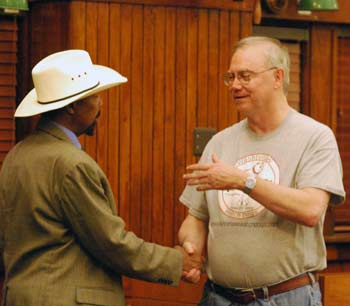
From left: Lefiest Galimore and Doug Smith at the Oct. 16 county board meeting. Galimore opposes Michigan’s Stand Your Ground law, which Smith supports.
Unlike speakers at the Oct. 2 meeting who were primarily from outside of Washtenaw County, most of the 20 people who supported Stand Your Ground on Oct. 16 – and who opposed the resolution urging its repeal – said they lived in Washtenaw County, including residents of Ann Arbor, Saline, Ypsilanti and several of the townships.
Many argued that law-abiding citizens should have the right to defend themselves, and that Stand Your Ground prevented victims from being prosecuted as killers. Some stated that repealing Stand Your Ground would embolden predators and threaten the safety of residents. Others argued that this was a state issue that the county board was not in a position to address.
A couple of speakers – including Dennis Moore of the Willow Run Tea Party Caucus – pointed out that this resolution is energizing supporters of Stand Your Ground and creating common ground for people of different political parties.
Most of the 12 opponents of Stand Your Ground were from Ann Arbor, including Lefiest Galimore, who has advocated for this kind of resolution at previous Ann Arbor city council and county board meetings. He said he didn’t oppose gun ownership, but he supported the repeal of Act 309. It’s not an anti-gun movement, but it’s about protecting every citizen in the community, he said. Others who spoke in support of the resolution included two pastors, at least two members of the Interfaith Council for Peace & Justice, and two physicians – Jerry Walden and Andrew Zweifler, representing Physicians for the Prevention of Gun Violence. The majority of those speakers stated they supported non-violence, criticized the increasing prevalence of guns and America’s high murder rate compared to other countries, and argued that the law is applied in discriminatory ways against minorities.
During a second opportunity for public commentary – which occurred around midnight – six people spoke in support of the Stand Your Ground law, including some who had addressed the board earlier in the meeting.
Stand Your Ground: Initial Board Discussion
After about 90 minutes of the initial public commentary at the start of the meeting, several commissioners responded. Andy LaBarre (D-District 7) thanked everyone for coming. It was heartening to see such engagement and active democracy, he said, adding that he’d like it to extend to other issues as well.
Dan Smith (R-District 2) said he appreciated that people had shown up and he noted that there would be another opportunity for public commentary later in the evening. He said there seemed to be some misunderstanding about what the resolution will do. “It does absolutely nothing,” D. Smith said.
Conan Smith (D-District 9) also thanked people for coming out and sharing their thoughts. It’s gratifying that people have spent time to understand the issue deeply. Regarding whether this resolution is within the purview of the county board, C. Smith stated that the county funds the sheriff’s department, as well as the criminal justice system – including the prosecuting attorney’s office. “So state laws that impact the operations of those functions within the county are of concern to this board,” he said. The board might not have control over the legislation, but informing state legislators “about what motivates the folks here in Washtenaw County” is important, C. Smith said, and the way that the board does that is through resolutions. The resolutions don’t have the force of law, he added, but they do communicate the board’s interests.
Alicia Ping (R-District 3) agreed with Dan Smith that the resolution does nothing, and she reminded other commissioners that “we are not a lobbying organization. We are a legislative body.” This isn’t an issue in Lansing now, she said. Residents are welcome to lobby state legislators directly, she added. “We are not an intermediary.” Her statement resulted in applause from residents in the boardroom.
Stand Your Ground: Final Board Action
The agenda item for the Stand Your Ground resolution was taken up at about 12:30 a.m. Felicia Brabec (D-District 4) said she’d spent time reading and reflecting on the law, but her main concern is that the application of the law doesn’t meet its intent.
Dan Smith (R-District 2) pointed out that there are six state legislators representing the residents of Washtenaw County – including one who had attended the meeting earlier in the evening. [He was referring to state Sen. Rebekah Warren (D-District 18), who is married to county commissioner Conan Smith.] “We even have the First Constituent in Lansing, so we have a bonus in this county,” he joked. [The reference was to Gov. Rick Snyder, a Republican who lives in the Ann Arbor area.] This is not county business, D. Smith said. The process is to take concerns to Lansing, and not bring them to the county board.
D. Smith noted that the county board has a lot of local business to conduct, and he observed that the board postponed discussion of the proposed budget that evening. “We need to stick to Washtenaw County business, and let Lansing do Lansing’s business.”
Ronnie Peterson (D-District 6) thanked residents for attending and for their patience, saying it was the longest meeting he could recall in all his years on the board. [It adjourned at about 12:45 a.m.] “It shows that government is working,” he said. The Stand Your Ground resolution is not an easy vote for him, Peterson said, and he’s talked with a lot of constituents about it. He thought the discussion had been healthy.
Everyone knows what brought this issue to the forefront, Petersen said, adding that he didn’t want to politicize it. [The reference was to the Trayvon Martin killing in Florida.] Peterson said that he hadn’t been contacted by any national organization, as some people had implied.
Peterson stated that he believes in the right to own guns, and most gun owners are decent, law-abiding citizens. He said he knows what it means to be a victim of crime. But America needs a more peaceful environment. The country is far too violent, he said, and that topic deserves more discussion.
Outcome: The resolution passed on a 5-4 vote. The five commissioners who voted in favor of the resolution were Felicia Brabec (D-District 4), Ronnie Peterson (D-District 6), Andy LaBarre (D-District 7), Yousef Rabhi (D-District 8) and Conan Smith (D-District 9). Voting against it were Kent Martinez-Kratz (D-District 1), Dan Smith (R-District 2), Alicia Ping (R-District 3), and Rolland Sizemore Jr. (D-District 5).
Stand Your Ground: Legal Action
The following week, David Raaflaub filed a lawsuit against the Washtenaw County board of commissioners over its Stand Your Ground resolution. [.pdf of board resolution] [.pdf of Raaflaub complaint]

Ian Reed Twiss, an Ann Arbor resident, talks with commissioner Alicia Ping (R-District 3). Twiss is pastor at Holy Faith Church in Saline, which is located in Ping’s district. He spoke during public commentary on Oct. 16 to support the board’s resolution about repealing Michigan’s Stand Your Ground law. Ping voted against that resolution.
The complaint, filed on Oct. 21 in the 22nd Circuit Court of Washtenaw County, asks the court to determine two issues: (1) what authority the board has that enables it to “draw conclusions of law,” and (2) what authority the board has to represent the county in seeking changes to state law.
Curtis Hedger, the county’s corporation counsel, stated in an Oct. 24 email to The Chronicle that the county is in the process of retaining counsel who will respond to the lawsuit on the board’s behalf.
Reached via email on Oct. 24, Dan Smith indicated that he would bring forward a resolution to rescind the board’s previous action, if it’s determined that the county will incur additional costs – such as fees for outside legal counsel – to defend the lawsuit.
Raaflaub is a member of the Washtenaw County Republican executive committee. He was the Republican candidate for county commissioner in District 6 in the November 2012 election, running against incumbent Democrat Ronnie Peterson, who won that election.
Raaflaub’s filing indicates that the filing is “pro se” – that is, he’s representing himself. He is currently suspended by the state bar from the practice of law.
Veterans Relief, Act 88 Tax Hikes
Increases to two taxes for the upcoming 2014 budget – one for veterans relief services, and another for agricultural and economic development – were on the Oct. 16 agenda.
Commissioners were asked to give final approval to levy a 0.0333 mill tax for indigent veterans services, following an initial vote on Oct. 2. The new rate of 1/30th of a mill would be levied in December 2013 to fund services in 2014. It’s expected to generate $463,160 in revenues. The current rate, approved by the board last year and levied in December 2012, is 0.0286 mills – or 1/35th of a mill. It generated $390,340 this year.
According to a staff memo, the additional revenue is needed to address rising claims, the anticipated release of current active duty soldiers, the increased cost of living reflected in claims, continued increases to demand, and an increased workload due to the Washtenaw County Veterans Treatment Court.
The county’s position is that it is authorized to collect up to 1/10th of a mill without seeking voter approval. That’s because the state legislation that enables the county to levy this type of tax – the Veterans Relief Fund Act, Public Act 214 of 1899 – predates the state’s Headlee Amendment. The county first began levying this millage in 2008. Services are administered through the county’s department of veterans affairs. The county had held a public hearing on this tax proposal at its Sept. 18 meeting, but no one spoke.
A public hearing and initial vote were held on Oct. 16 for the economic development and agricultural tax, known as Act 88 of 1913. The proposed increase to the Act 88 millage is from 0.06 mills to 0.07 mills. The millage would be levied in December 2013 and would raise an estimated $972,635.
According to a staff memo, the funds would be allocated to the following groups:
- $423,135: Washtenaw County office of community & economic development
- $200,000: Ann Arbor SPARK
- $100,000: Eastern Leaders Group
- $52,000: Promotion of Heritage Tourism in Washtenaw County
- $50,000: SPARK East
- $50,000: Detroit Region Aerotropolis
- $82,500: Washtenaw County 4-H
- $15,000: Washtenaw County 4-H Youth Show
The enabling legislation for this tax is also pre-Headlee, and the county board levies the tax without voter approval.
Veterans Relief, Act 88: Public Commentary & Public Hearing
Two executives from Ann Arbor SPARK – Donna Doleman, vice president of marketing and communications, and Luke Bonner, vice president of business development – spoke in support of the Act 88 funding during public commentary at the start of the Oct. 16 meeting. Doleman thanked commissioners for partnering to create jobs for this region through investment in economic development.
Doleman highlighted SPARK’s work in business retention, expansion and attraction, saying it’s become a model for the country. She listed several accomplishments that the agency has achieved. Some of those items were included in handouts provided to the board. SPARK’s national and international prestige gives it an edge in marketing this region, Doleman said. Thirty percent of the views on a business attraction video have been international, she noted. [.pdf of SPARK handout 1] [.pdf of SPARK handout 2] [.pdf of SPARK handout 3]
Bonner echoed Doleman’s comments, saying that without the county’s support, SPARK wouldn’t be able to accomplish what it has. This year alone, he said, SPARK has helped secured $100 million in new investment and 1,200 jobs. He highlighted two examples: American Broach & Machine in Ypsilanti, and Universal Marketing Group, which is expanding its call center operation from Toledo. Bonner also described SPARK’s help in marketing the former GM property in Ypsilanti Township.
Leigh Greden introduced himself as vice president of government and community relations at Eastern Michigan University, and a resident of the district in Ann Arbor that’s represented by county commissioner Yousef Rabhi. He urged the board to approve the increase in the Act 88 millage. The low cost of just 73 cents per month for the average homeowner allows the county to support a variety of tangible projects, he said, including Ann Arbor SPARK’s initiatives, heritage tourism, and the Eastern Leaders Group. Greden noted that he serves as co-chair of the ELG along with Bob Tetens, director of the county’s parks and recreation commission. He described the ELG’s efforts, including the Live Ypsi program that encourages EMU staff and faculty to buy homes in the city, which results in more people paying taxes there. Act 88 funding also helped Michigan Ladder Co. in Ypsilanti, he said. “None of these programs would have been possible without the Act 88 millage,” Greden said. When something works, he concluded, “keep doing it.”
Doug Smith began by saying he wouldn’t give his address, contending that requiring someone to give their address violated Michigan’s Open Meetings Act. The two tax increases that the board will be voting on will push the county above the constitutional limit of 18 mills, he said. He asked the board to refrain from voting until the county has made public its legal justification for exceeding the limit. Until 2008, activities that are now funded through the veterans relief and Act 88 millages were paid for out of the county’s general fund. He read a section from the Headlee Amendment, which the state enacted in 1978:
Units of Local Government are hereby prohibited from levying any tax not authorized by law or charter when this section is ratified or from increasing the rate of an existing tax above that rate authorized by law or charter when this section is ratified, without the approval of a majority of the qualified electors of that unit of Local Government voting thereon.
It seems the county’s corporation counsel is saying that since the veterans relief and Act 88 laws allowed the levying of millages prior to 1978, that these can be levied in excess of the 18-mill cap without a vote by the county’s citizens, Smith said. He called the levies “legally dubious” and said he’s trying to do legal research to verify that. He hasn’t been able to find anything published by the county that gives a legal justification for these millages. Are any other counties using these levies above the 18-mill cap? Have the levies ever been tested in court, and is there published case law? Does it matter that the veterans relief law states “shall” and the Act 88 law states “may” levy a tax?
Doug Smith pointed out that the Headlee Amendment states that any taxpayer in Michigan shall have standing for a lawsuit in Michigan’s Court of Appeals to enforce it, so all it would take is one taxpayer willing to challenge this tax, and the county would find itself in court. He again asked that the board hold off on voting until the corporation counsel has published an opinion on the taxes for all citizens to see.
Smith also spoke during the Act 88 public hearing later in the meeting, which occurred around midnight. He pointed out that Act 88 allows for the spending of proceeds for specific purposes. From Act 88:
… for the purpose of advertising the agricultural advantages of the state or for displaying the products and industries of any county in the state at domestic or foreign expositions, for the purpose of encouraging immigration and increasing trade in the products of the state, and advertising the state and any portion thereof for tourists and resorters, and to permit the boards of supervisors out of any sum so raised, or out of the general fund, to contribute all or any portion of the same to any development board or bureau to be by said board or bureau expended for the purposes herein named.
Smith wondered whether anyone checks with Ann Arbor SPARK to ensure that those requirements are met. Referring to the example that SPARK vice president Luke Bonner had given about American Broach, Smith described it as a wholly-owned Chinese company that does all of its manufacturing in China. The local operation is for research and development, he noted. “So what exactly is the Washtenaw County product that is being advertised and promoted?” He also objected to holding public hearings after midnight, saying that it doesn’t promote participation by the public.
In response to the public commentary, Rolland Sizemore Jr. (D-District 5) expressed his support for Act 88, especially for the funding it provides to the Detroit Aerotropolis, Ann Arbor SPARK, and the Eastern Leaders Group.
Act 88: Board Discussion – Amendment (Increase to 0.09 mills)
When commissioners reached the Act 88 agenda item, Conan Smith (D-District 9) began by proposing a policy and process for allocating Act 88 funds. However, he was told by Curtis Hedger, the county’s corporation counsel, that it would need to be considered later in the agenda, as an item for current or future discussion.
C. Smith then referred to a handout that had been provided at the Oct. 3 working session, which outlined Act 88 investment options. The handout listed items that could be funded if the millage remained at the current 0.06 mills ($819,714), or if it were increased to 0.07 mills, 0.08 mills or 0.09 mills. [.pdf of Act 88 options]
C. Smith noted that each of the options was backed by a strategic or business plan, and was built off of work that the county has been doing for several years. For example, a levy of 0.07 mills would allow for $50,000 to fund a commercial kitchen incubator for youth skills development. However, he said, that program doesn’t really thrive unless there’s also funding for a local food manufacturing project – which would require more funding and a higher millage rate.
He also expressed support for a “community capital acceleration” program, which at 0.07 mills would be funded for $10,000. But if it’s not launched with sufficient funding, he said, “we’re sort of undermining our own efforts.”
At that, C. Smith made a motion to amend the proposed 0.07 mills and raise the allocation to 0.09 mills.
Outcome: The motion died for lack of a second.
Act 88: Board Discussion – Amendment (Increase Allocations + Millage Rate)
C. Smith then moved to increase the millage rate in order to fund an increase for the community capital acceleration program – from $10,000 to $35,000. Dan Smith (R-District 2) supported the motion, noting that his support was in order to move the item forward for debate. It didn’t necessarily mean that he supported the amendment itself.
But C. Smith decided to withdraw that motion. He indicated that there were actually three items that he felt needed an increase in funding – beyond the amounts that would be funded with an 0.07 mill tax. So he moved to increase the millage rate in order to fund increases for those specific items: the community capital acceleration program (from $10,000 to $35,000); a local business employment cooperative (from $15,000 to $50,000); and market analysis for a local food manufacturing, processing and distribution system ($50,000 – this was not funded at 0.07 mills).
He estimated these programs could be funded at his proposed level – a total of $110,000 – by increasing the millage rate to 0.0725 mills.
Outcome: That motion also died for lack of a second.
Act 88: Board Discussion – Amendment (Increase Allocations Only)
Yousef Rabhi (D-District 8) asked Mary Jo Callan – director of the office of community and economic development, which administers several Act 88-funded programs – to come forward and explain the itemized funding list that C. Smith was referencing. She explained that the list was intended to indicate various funding levels for several programs, based on potential increases to the millage rate.
Callan pointed out that the resolution on the board’s agenda that night did not increase the earmarks for specific projects or organizations, compared to the current funding levels. Rather, the resolution would increase the millage rate from 0.06 mills this year to 0.07 mills in 2014. The extra funding would be allocated to the office of community and economic development as a placeholder, to be subsequently allocated to specific programs in the future. She hoped that the board would eventually allocate the extra funds using the process and policy that C. Smith had drafted and shared at the Oct. 3 working session. That’s up to the board, she said.
Alicia Ping (R-District 3) then proposed an amendment that would increase funding in the three line items that C. Smith had mentioned, but without increasing the overall millage rate beyond 0.07 mills.
Rabhi said he couldn’t support Ping’s amendment. The Act 88 resolution needed to move forward, he said, but the board should use C. Smith’s policy to determine priorities for allocating the excess revenues, rather than allocating some of those revenues now. There needs to be more discussion about that, he said.
C. Smith said he appreciated Ping’s effort, but he wouldn’t support it because it would shift funding away from other projects, rather than increase the overall funds. If the overall millage rate isn’t being increased beyond 0.07 mills, then he wanted to go through the process of prioritizing all the possible additional projects.
Outcome: Ping’s amendment was defeated on a 3-6 vote, with support only from Ping, Dan Smith (R-District 2) and Ronnie Peterson (D-District 6).
Act 88: Board Discussion – Partnerships
Rolland Sizemore Jr. (D-District 5) expressed concern that some of the programs supported by Act 88 funds were duplicating efforts that other entities in the county are already pursuing. He noted that Washtenaw Community College, for example, already has a food service program, which might duplicate the proposed commercial kitchen incubator. He also wondered why hotels aren’t helping to pay for it.
Mary Jo Callan replied that OCED can explore more partnerships, in addition to those that are already in place. She said the county did an analysis of what’s available, because they don’t want to duplicate programs. Tony VanDerworp of OCED described the work that’s been done to develop the kitchen incubator proposal, including discussions with local schools. The county doesn’t want to operate it, he said, but would help facilitate the program.
Sizemore also objected to allocating $10,000 for developing the community capital acceleration program, saying there are educational institutions that have expertise that the county might be able to tap without spending money.
Act 88: Board Discussion – Amendment (Exemptions from TIF)
Dan Smith put forward an amendment calling for the Act 88 levy to be exempt from capture by tax increment financing (TIF) districts or authorities in the county to the greatest extent allowed by law.
Andy LaBarre (D-District 7) said he’d support the amendment, but he wondered why it was appropriate for this millage more than any other one.
D. Smith explained that this is a millage that the board votes on every year. He planned to offer a similar amendment for the veterans relief millage. These millages are levied for very specific purposes, and he thought that the millages should be exempt from as much tax capture as possible so that the revenues will be used solely for the purpose that was intended.
Outcome: The amendment was passed 8-1 over dissent from Kent Martinez-Kratz (D-District 1).
Later in the meeting, D. Smith made a similar amendment for the veterans relief millage. It was also passed on an 8-1 vote over dissent from Kent Martinez-Kratz. The board also gave final approval to the increase in the veterans relief millage.
Act 88: Board Discussion – Legal Opinion
Referring to issues raised during public commentary, Ronnie Peterson (D-District 6) indicated that he’d like to see a legal opinion by the board’s next meeting about whether the veterans relief and Act 88 millages are overstepping the county’s constitutional authority.
Dan Smith (R-District 2) noted that the staff memo accompanying the Act 88 resolution provides some detail about the history of the Act 88 legislation, in that it predates the state’s Headlee Amendment. [.pdf of Act 88 staff memo]
But he said that despite his repeated requests to the county administrator and corporation counsel, there’s no mention in the staff memo about how the millage is allowed under Article 9, Section 6 of the Michigan Constitution, or the 18-mill levy limit, or the 5.5 mill county operating millage.
D. Smith expressed concern that the Act 88 levy might be unconstitutional. Very few counties are levying Act 88, and Washtenaw County might be the only county that’s levying the veterans relief millage, he said.
Curtis Hedger, the county’s corporation counsel, replied that he and D. Smith had discussed this issue, and that Hedger had provided the legal rationale. However, Hedger said he would never put a legal opinion in a cover memo unless he’s directed by the board to do so. The board is his client – not individual commissioners, he said – and he writes legal opinions under the board’s direction. If the board directs him to write a legal opinion, he’d do that and provide it to commissioners, Hedger said. Once they receive it, he added, they can do with it whatever they want. But he felt uncomfortable putting that kind of detailed legal analysis in a cover memo.
D. Smith noted that the memo points to another state statute as justification for the levy. “I’ve told corporate counsel repeatedly: ‘Convince me that this is indeed a legal levy,’” D. Smith said. If it’s legal, then there would be opportunities to consider a levy under Act 283, and it would give townships the opportunity to consider levies under Act 51. [Act 283 of 1909 and Act 51 of 1951 both address tax levies for road construction and repair.] If those are legal statewide, he added, then there would be over three-quarters of a billion dollars available for roads that could be levied and managed locally. “So I am more than willing to be convinced about these levies and how we are allowed to exceed the very clear constitutional limits,” D. Smith said.
However, he added, Hedger seems to be taking bits and pieces from different statutes “to suit the outcome that’s desired, and I completely disagree with it.” He said he wasn’t asking for a formal legal opinion, but rather for “casual discussion” similar to what’s already in the staff memo, which mentions the Headlee Amendment. There are already specific references to state legislation in the memo, he noted, and he was asking for additional commentary of that nature.
Act 88: Board Discussion – Policy
Later in the meeting, C. Smith put forward a draft policy and process for allocating Act 88 revenues. [.pdf of Act 88 policy] [.pdf of Act 88 process]
Ronnie Peterson supported it, saying he’d like to see something similar for the coordinated funding program, which allocates dollars for human services. He said the Act 88 policy is essential to move forward along with the resolution on setting the Act 88 millage.
Yousef Rabhi said it was up to the board to decide whether to adopt the policy, but he supported it. Andy LaBarre didn’t think the board could come up with a better process than the one C. Smith put forward. He thanked C. Smith for developing it.
Outcome: The Act 88 policy and process was given initial approval with little discussion, over dissent from Rolland Sizemore Jr. (D-District 5). A final vote on that policy will likely occur on Nov. 6.
Veterans Relief, Act 88: Board Votes
Outcome on Act 88: An initial vote on levying Act 88 at 0.07 mills passed on an 8-1 vote, over dissent from D. Smith. A final vote is expected on Nov. 6.
Outcome on Veterans Relief: A final vote on levying 0.0333 mills for indigent veterans services passed unanimously.
Pittsfield State Street CIA
On the agenda was a resolution to approve participation in Pittsfield Township’s State Street corridor improvement authority (CIA).
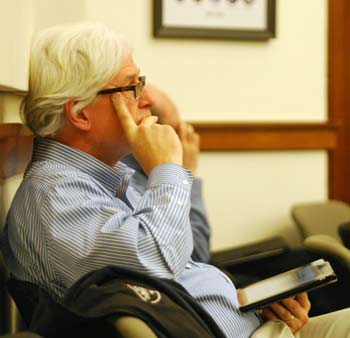
David Sarns, a member of the State Street corridor improvement authority board in Pittsfield Township, attended the Oct. 16 county board meeting. He did not formally address the board.
The resolution would authorize the county administrator to sign a tax-sharing agreement with Pittsfield Township and the State Street CIA, which is overseen by an appointed board. [.pdf of agreement] The agreement would allow the CIA to capture 50% of any county taxes levied on new development within the corridor boundaries, not to exceed $3,850,464 over a 20-year period, through 2033. The purpose is to provide a funding mechanism for improvements to the State Street corridor roughly between the I-94 interchange and Michigan Avenue, as outlined in the CIA development and tax increment financing plan. [.pdf of TIF plan]
The Pittsfield Township board of trustees held a public hearing on the CIA at its Oct. 9, 2013 meeting. That started the clock on a 60-day period during which any taxing entities within the corridor can “opt out” of participation. The Washtenaw County parks & recreation commission voted at its Oct. 8, 2013 meeting to participate . Other local taxing entities in the corridor are Washtenaw Community College, the Huron Clinton Metro Authority, and the Saline and Ann Arbor district libraries. The Ann Arbor District Library board discussed the issue at its Oct. 21, 2013 meeting.
In total over the CIA’s 20-year period, the plan anticipates capturing about $14 million in local tax dollars. That amount would provide about a local match to be used to secure federal funding for the bulk of the estimated $30 million project.
Pittsfield State Street CIA: Board Discussion – Postponement
Dan Smith (R-District 2) began deliberations by noting that in 2011 and 2012, the board spent considerable time discussing the county’s involvement in an authority “that wasn’t going to cost us anything.” [He was referring to a countywide transit initiative, spearheaded by the Ann Arbor Area Transportation Authority, that ultimately failed to garner support throughout the county. It attempted to create a new transit authority under Act 196, but did not involve TIF financing.]
D. Smith recalled that the first public discussion of the transit authority was in April 2011, with the first vote on it over a year later – on July 17, 2012.
In contrast, the county’s participation in the State Street CIA will cost about $3.85 million over 20 years, he noted. The board was first presented with this proposal at a working session 13 days prior to the Oct. 16 meeting, D. Smith said, and commissioners need more time to sort through concerns.
D. Smith then moved to postpone the item until Nov. 20.
Andy LaBarre (D-District 7) said this is an issue where time is of the essence, and the board should discuss it that night.
Rolland Sizemore Jr. (D-District 5) wondered why D. Smith hadn’t tried to get his questions answered before proposing to postpone. Sizemore also pointed out that there will be two weeks before the board takes its final vote, on Nov. 6. There will be plenty of time to get questions answered. Sizemore noted that several Pittsfield Township officials were attending the meeting and could answer questions.
Outcome: The motion to postpone failed on a 2-7 vote, with support only from D. Smith and Conan Smith (D-District 9).
Pittsfield State Street CIA: Board Discussion – Substitute Resolution
D. Smith then moved a substitute resolution stating that the county would not participate in the CIA. [.pdf of D. Smith's substitute resolution] He said he supported the road improvement project, but objected to the TIF funding mechanism. He noted that the county had the ability to invest directly in the project using general fund money – which is allowed by Act 119 of 2011.
He also pointed out that if the county participates in the CIA, the county board would have no control over how its portion of the captured taxes are spent. For example, if certain aspects of the project turn out to be more expensive than anticipated, the CIA board might decide to cut back on items in the plan, such as non-motorized pathways.
The CIA mechanism also only addresses a specific problem in Pittsfield Township, D. Smith noted. There are many parts of the county that can’t use a CIA. For example, North Territorial Road in his district needs improvement, but there’s not enough development along that road to make a CIA viable, he said.
D. Smith also pointed out that the board has not developed any policies or procedures regarding TIFs, to help guide the board’s decisions. Yousef Rabhi (D-District 8) stated that he supported developing such a policy.
Conan Smith (D-District 9) observed that the board has been working to align its general fund investments with its strategic priorities. One way to make those strategic investments is through direct appropriations. Another way is through tax expenditures of DDAs, TIFAs and CIAs that capture dollars that would otherwise go to the general fund, but that are redirected to specific projects. In this particular case, there’s nothing wrong with the proposed State Street project, C. Smith said. But the board hasn’t been investing in road projects as a priority – as those are handled by the road commission. The CIA will capture dollars that won’t be used for investments that the board has set as priorities. Right now, C. Smith said, he’s not comfortable taking money that he thinks should go toward human services, and instead putting those funds into a road project.
C. Smith advocated for developing a rubric to help the board decide whether to invest in road projects, and if so, what specific road projects should be prioritized.
Another concern is that a lot of anticipated revenue for the State Street CIA is rooted in potential future development, C. Smith noted. Some projects would be built regardless of whether improvements are made to the corridor, he said, and those new tax dollars should be going toward priorities like human services. It’s also unclear how much future development will materialize.
These are complicated issues, and that’s why he supported postponement, C. Smith said. Short of that, he thought the county should not participate at this time.
D. Smith pointed out that the decision not to participate would not necessarily be permanent, because the county board could rescind this resolution at any point. Rescinding his resolution would trigger participation in the CIA.
Yousef Rabhi (D-District 8) wondered if the county board could specify how its portion of the TIF capture is allocated within the CIA. That is, could the county earmark its TIF capture for non-motorized transportation elements? Dick Carlisle, the planning consultant who’s been hired by Pittsfield Township to work on this project, replied that in a sense the money is already earmarked. That’s because the non-motorized paths and bike paths are already in the CIA plan. The project wouldn’t be able to proceed without these elements being included, Carlisle said. Mandy Grewal, the township’s supervisor, pointed out that the township zoning requires that new roads be built using Complete Street principles.
Rabhi noted that the county board wouldn’t be adopting the CIA plan, but would be voting on the agreement with Pittsfield Township regarding the CIA, which doesn’t specifically address elements of the plan. Curtis Hedger, the county’s corporation counsel, confirmed that the CIA will decide how the money is spent. Rabhi floated the idea of amending the agreement to include more details about how the county’s money should be spent.
Saying that her patience was wearing thin because of the length of the meeting, Alicia Ping (R-District 3) said there’s nothing that irritates her more than when Lansing tries to tell the county what to do. Now that’s what the county is trying to do to Pittsfield Township, she said. “I think that’s completely out of line.”
Anyone who’s driven through Pittsfield Township will know that it’s radically different now, she said, with better roads and non-motorized paths. These are competent people running the township, she said.
Ping said that the CIA is the best model for this project, because if there’s no growth, the county won’t lose any revenue. “I think we’d be foolish not to support this,” she said. Ping hoped the board would look at the bigger picture.
C. Smith replied, saying it was wrong of Ping to insinuate that his perspective on this is foolish or poorly thought out, or that he didn’t care about people in this community, or that it’s not worth it to talk about more than $3 million in county dollars. This isn’t similar to Lansing telling the locals what to do, he said. This is about what to do with county-generated revenue, he said – whether the board will put it toward priorities that commissioners have articulated over the years, like helping poor people, or whether it will fund a road. “That is an important conversation for us – that’s not foolish,” C. Smith said. “This is about our priorities. So I’m frustrated that it would be just dismissed.” To get brushed off like that is wrong – it’s rude, he said.
Later in the meeting, Ping indicated that she thought she’d said that Pittsfield Township wouldn’t bring a foolish plan to the board. If she’d said something differently, she hadn’t intended to. C. Smith replied by saying that he loved her.
D. Smith noted that this issue isn’t about trust or distrust of Pittsfield Township officials. It’s about a 20-year plan. It’s unlikely that county commissioners will be around in 20 years, and the same is true for members of the Pittsfield Township and CIA boards, he said. The issue is that the county board should properly look out for the $3.8 million in county revenues for the best interest of everyone in the county. “We only have one chance to get out of the CIA and out of TIF capture,” he said. The board would have the chance to join the CIA later, if that’s what commissioners decide after sorting out all these other issues. But once they join the CIA, the control is out of the county’s hands, he said.
Outcome: The vote on D. Smith’s opt-out resolution failed on a 2-7 vote, with support only from D. Smith and C. Smith.
Pittsfield State Street CIA: Board Discussion – Original Resolution
Discussion continued.
D. Smith pointed out that municipalities around the county have found other ways to pay for roads. Ypsilanti Township is using bonds. Scio Township is in the process of levying $85 per parcel in a township-wide special assessment district to fund road repair. The city of Ann Arbor has a 2 mill tax for streets. Superior Township dedicates a significant portion of its general fund budget for roads. Salem Township took money out of its general fund reserves to invest in road repairs on North Territorial. His point was that municipalities have found ways to pay for roads without coming to the county for TIF funding, he said.
The Pittsfield Township board seems to be set on using this mechanism and no other, D. Smith said. He understood their rationale: If the township can get $3.8 million from the county, why should they levy an additional tax on Pittsfield Township residents or use a special assessment? He said that at the Oct. 9 public hearing of the Pittsfield Township board, supervisor Mandy Grewal had claimed that the CIA was the only tool that was available for State Street repair. However, there are other tools available, D. Smith noted.
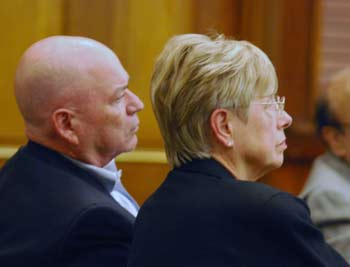
Pittsfield Township clerk Alan Israel and treasurer Patricia Scribner were among the township officials who attended the Oct. 16 meeting of the Washtenaw County board of commissioners.
D. Smith again stated that he had no problem with this project, but objected to the funding mechanism. There are other ways that the county can participate, which would allow the board to have more control. If the county joins the CIA, then dollars that the taxpayers approved for natural areas preservation would be used for roads. He wasn’t sure how many people would be willing to renew that millage when they find out that the dollars are being used for a different purpose. The same is true for the parks millage, he said.
D. Smith reported that the people who spoke against the CIA at the Oct. 9 public hearing outnumbered supporters. He said Grewal had later characterized opponents of the CIA as her political opponents. He pointed out that in the 2012 election, the entire township board had been unopposed. He said he had serious concerns about the proposal, though he’d like to support the project with a different funding mechanism.
Several other commissioners expressed support for the project, calling State Street an important transportation artery. Yousef Rabhi said that all the concerns he raised at the board’s Oct. 3 working session had been addressed in the agreement that Pittsfield Township brought forward.
Rabhi said it would have been good if commissioner Felicia Brabec (D-District 4) had been appointed to the CIA board, because her district covers Pittsfield Township. Jim Fink, an attorney representing the township, noted that the CIA board is appointed by the township supervisor and the state statute doesn’t prohibit appointing a county commissioner. Rabhi said he wouldn’t push the issue of a board appointment, but he hoped it would be considered in the future.
D. Smith clarified with consultant Dick Carlisle that the county’s EECS tax (enhanced emergency communication system) would be exempt from capture, based on the agreement that the county board would be voting on that night. Carlisle also confirmed for Smith that the tax capture would apply to increases due to inflation as well as increases resulting from new development.
In total, the board debated the issue and asked questions of Pittsfield Township representatives for about 90 minutes. Questions were fielded by supervisor Mandy Grewal, consultant Dick Carlisle, attorney Jim Fink, and Craig Lyon, the township’s director of utilities and municipal services.
Outcome: Commissioners voted 8-1 to give initial approval to participate in the CIA, with dissent from Dan Smith (R-District 2). A final vote is expected on Nov. 6.
Pittsfield State Street CIA: TIF Policy
Near the end of the meeting, Yousef Rabhi brought forward a resolution directing county administrator Verna McDaniel to develop a policy for evaluating future tax increment financing (TIF) proposals. The resolution stated that the policy would be developed with input from staff of the office of community and economic development, the equalization department, and the brownfield redevelopment authority.
Alicia Ping (R-District 3) indicated she would not support this, because each TIF proposal is unique.
Outcome: The item passed on a 7-2 vote with dissent from Dan Smith (R-District 2) and Alicia Ping (R-District 3).
Washtenaw County Court Budget
On the Oct. 16 agenda was an item giving final notice to eliminate a lump-sum budgeting approach for Washtenaw County’s court system.
The issue had arisen this summer, when commissioner Alicia Ping (R-District 3) had brought forward a resolution to give notice to the courts. She did that at the board’s June 5, 2013 meeting in a move that caught some commissioners by surprise, although for several weeks during earlier budget deliberations Ping had expressed concerns over the county’s approach to funding the court system. Voting in favor of initial approval on June 5 were Ping, Conan Smith, Dan Smith, Andy LaBarre and Kent Martinez-Kratz. Voting against the proposal initially were Yousef Rabhi, Ronnie Peterson, Rolland Sizemore Jr. and Felicia Brabec.
Then at the county board’s July 10, 2013 meeting, when the item was on the agenda for final approval, the board had voted to postpone a final vote until Oct. 16. The rationale was that it should be coordinated with approval of the 2014 budget.
Ping had stated that her goal wasn’t necessarily to cut funding for the courts, but rather to be more transparent about where the money goes. Giving a notice to terminate the agreement would have given the board the option to end it.
The courts have historically been in favor of a lump-sum approach, rather than the line-item budget provided by most other units of county government. The courts operate under a memorandum of understanding with the board of commissioners. The board unanimously approved that MOU on Jan. 19, 2011, replacing one that had been in place since 1990. [.pdf of memorandum of understanding] The agreement states that the county will provide “lump sum” funding to the courts, allocated to: (1) the trial court – an entity that includes the 22nd Circuit Court, court clerk services, juvenile court, Friend of the Court, and probate court; (2) 14A District Court; and (3) a portion of the county’s child care fund. The county does not have line-item budgeting authority, but the courts agreed to submit a bi-annual line-item budget, and to provide quarterly financial projections.
From the general fund, the lump-sum payment to the courts in 2013 totals $19,155,029 – with $13,353,110 for the trial court and $5,801,919 for district court. In addition, state funding for certain trial court operations – the Friend of the Court and child care fund – totals $4,977,047.
On July 10, Ping reported that chief judge Donald Shelton had provided a detailed document regarding the court’s budget, and that he had indicated a willingness to meet with commissioners and the administration about this issue. She said she wanted to give commissioners time to digest the additional information, and to hear the county administrator’s budget proposal for the general fund. County administrator Verna McDaniel and her finance staff presented a four-year budget proposal for 2014-2017 at the board’s Oct. 2, 2013 meeting.
Washtenaw County Court Budget: Board Discussion
The board reached this item on the agenda after midnight. Dan Smith (R-District 2) began deliberations by noting that on Oct. 15, a state Senate committee had voted on HB 4704, which would change the law about who can bring lawsuits against the county. The bill has already passed the House and will be taken up soon by the Senate. Given that, he moved to postpone the county board resolution until Dec. 4.
The legislation was described in an email sent to the board from the Michigan Association of Counties:
The bill will encourage countywide elected officials to work budget issues out with the county board of commissioners, rather than threaten or file a lawsuit. In addition to requiring the parties to talk, there are three main changes to current law. The bill provides an assumption that the appropriated amount is at a “serviceable level,” so the burden of proof is on the countywide elected official who chooses to sue. In addition, the bill requires the court to take into account the county board’s “ability to pay” in deciding the lawsuit. Finally, the bill requires that the countywide elected NOT spend over the budgeted amount prior to a decision in the case. These changes will help make sure that when a case occurs it is warranted, and it will help cut down on threats and frivolous filings.
Previous discussions about the court system’s budget have been tempered by the fear that the court might sue the county, if the board of commissioners didn’t provide adequate funding.
Ronnie Peterson (D-District 6) noted that chief judge Donald Shelton and court administrator Dan Dwyer had been waiting all night. He wanted to show them respect, he said. He noted that the bill would still require further action in the state legislature – noting that it may or may not be signed into law.
Shelton spoke briefly to commissioners, saying he welcomed an opportunity to continue the collegial relationship between the board and the courts, and he didn’t think a postponement would help with that relationship.
Outcome on postponement: It was defeated on a 1-8 vote, with support only from Dan Smith (R-District 2).
Outcome on main item: The final vote to eliminate lump-sum budgeting failed on a 3-6 vote, with support from only Dan Smith (R-District 2), Conan Smith (D-District 9) and Kent Martinez-Kratz (D-District 1).
Coordinated Funding
Commissioners were asked to give initial approval to an extension of the coordinated funding approach for human services, as well as to some changes in that funding model.
No dollar amounts were allocated, but the resolution authorized the allocation of children’s well-being and human services funding for 2014 through 2016. It authorized the continued management of those funds through the county’s office of community & economic development, using the coordinated funding approach – with some modifications.
The county is one of five partners in the coordinated funding approach. Other partners are city of Ann Arbor, United Way of Washtenaw County, Washtenaw Urban County, and the Ann Arbor Area Community Foundation. It began as a pilot program in 2010; this is the second time that the program has been extended.
The coordinated funding process has three parts: planning/coordination, program operations, and capacity-building. The approach targets six priority areas, and identifies lead agencies for each area: (1) housing and homelessness – Washtenaw Housing Alliance; (2) aging – Blueprint for Aging; (3) school-aged youth – Washtenaw Alliance for Children and Youth; (4) children birth to six – Success by Six; (5) health – Washtenaw Health Plan; and (6) hunger relief – Food Gatherers.
Last year, TCC Group – a consulting firm based in Philadelphia – was hired to evaluate the process. As a result of that review, several changes were recommended. Those recommendations would also be authorized as part of the county board’s overall coordinated funding resolution, as described in a staff memo:
The County’s Human Services and Children’s Well-being funding will continue to focus on critical services for early childhood, aging, housing/homelessness, safety net health, school-aged children and youth, and food security/hunger relief. Under this proposal, this funding will not necessarily be allocated to these six priority areas in proportional amounts consistent with historic trends. Allocations to these six priority areas will be based on identified community-level outcomes, the strategies that align with them, and how each are prioritized.
1) Under this proposal, the application pre-screening process will be broadened to better accommodate smaller non-profit organizations. New types of financial documentation will allow smaller agencies to illustrate their viability in the absence of an independent audit. 2) Capacity-building grants would be available to target smaller agencies that need to improve their governance or financial structure to be eligible for the application process, with the goal of expanding the opportunities for all agencies providing human services in the County in an equitable fashion.
Recommendations for specific funding allocations will be made to the county board in April 2014, for funding to start on July 1, 2014. In addition, the RNR Foundation – a family foundation that funded TCC Group’s evaluation of the coordinated funding approach – will now be an additional funder in this process. One of the goals of coordinated funding is to attract more partners, such as private foundations.
Coordinated Funding: Public Commentary
Tom Partridge introduced himself as a write-in candidate for Ward 5 Ann Arbor city council. He called for the county to go beyond the coordinated funding proposal and provide more extensive affordable housing, public transportation, and health care, and to end homelessness. He objected to the coordinated funding approach of giving money to multiple nonprofits, each with an executive director. He urged commissioners to put a countywide millage on the ballot for human services.
Coordinated Funding: Board Discussion
Ronnie Peterson (D-District 6) asked how needs are being determined, and when applications for funding would be coming to the board for approval.
Mary Jo Callan, director of the office of community & economic development, reminded commissioners that this vote would authorize continuation of the coordinated funding process. This wasn’t a vote to allocate specific dollars. She reviewed the history and approach that’s being used, as well as the review that was funded by the RNR Foundation.
Peterson said he was concerned about the direction that the county was taking, in terms of delivering services to those most in need. The board needed to make sure that its issues are addressed, and other entities should do the same, he said.
Callan explained that the request for proposals (RFP) is released in January, and the staff will bring back recommendations in April or May. Peterson said he hoped the board would have a discussion about priorities before the RFP is issued.
Conan Smith (D-District 9) said he agreed with Peterson, in that the board needs to set clear priorities for funding. What are the outcomes that the board expects from its funding? He thought the board should vote on metrics that the staff recommends – but that’s not happening, he said.
Callan disagreed, though she acknowledged that there seems to be a feeling that the board wasn’t consulted. She noted that during the last funding cycle, the staff brought to the board specific priorities and funding amounts for approval, before any dollars were distributed.
Callan said this next cycle will include further developing of community outcomes, much like the county board is doing for its budget priorities. It’s important to know whether investments are making a difference in the community, she noted. So there will be specific community outcomes developed for each of the six priority areas in the coordinated funding model. The outcomes will be developed using data and best practices, working with people who are out in the community doing this work.
C. Smith confirmed with Callan that she’ll be bringing back these outcomes and metrics to the board before the RFP is issued.
Outcome: Commissioners voted 8-1 to give initial approval to the coordinated funding program. A final vote is expected on Nov. 6.
2014-2017 Budget
No one spoke at a public hearing on the proposed 2014-2017 Washtenaw County general fund budget, which took place after midnight.
County administrator Verna McDaniel and her finance staff had presented the budget on Oct. 2, 2013.
The $103,005,127 million budget for 2014 – which represents a slight decrease from the 2013 expenditures of $103,218,903 – includes putting a net total of 8.47 full-time-equivalent jobs on “hold vacant” status, as well as the net reduction of a 0.3 FTE position. The recommended budgets for the following years are $103,977,306 in 2015, $105,052,579 in 2016, and $106,590,681 in 2017. The budgets are based on an estimated 1% annual increase in property tax revenues. [.pdf of draft budget summary]
McDaniel had previously indicated that the county would need to find $3.9 million in structural savings in 2014. On Oct. 2, she reported that $4.13 million in operating cost reductions had been identified.
An item on the Oct. 16 agenda called for continued discussion of the 2014-2017 budget. However, by the time the board reached that point in the agenda, it was about 11:30 p.m. Dan Smith (R-District 2) moved to postpone discussion until Nov. 6.
Outcome: Commissioners unanimously voted to postpone discussion of the 2014-2017 budget until Nov. 6.
Apportionment Report
On the Oct. 16 agenda was a resolution to approve the 2013 apportionment report – giving details of the 2013 taxable valuations for property in the county, broken down by municipality. The report also includes the amount of millages levied and the dollar amounts collected in taxes. December tax bills will be mailed out to property owners based on these calculations. [.pdf of 2013 apportionment report]
In April, the county’s equalization department produces an annual report describing Washtenaw County’s total equalized (assessed) value of property. The report is part of a state-mandated equalization process, and gives an indication of how much revenue the county will receive from property taxes in the coming year. [See Chronicle coverage: "Equalization: Washtenaw Property Values Rise."]
Later in the year – in October or November – the equalization and property description department presents an apportionment report, which gives details of the taxable valuations for property in the county, by municipality. The report also includes the amount of millages levied and the dollar amounts collected in taxes. Like the equalization report, the board is required by state law to vote on adopting the apportionment report.
This year, all the taxing entities in Washtenaw County will be levying in total an estimated $629.608 million in property taxes – an increase from $621.687 million in 2012. It’s also an increase from $622 million in 2011, but has not yet regained ground to the level of $639 million in 2010.
The county alone will levy an estimated $80.669 million, including millages for the general fund, parks & recreation, and Huron Clinton Metroparks.
Apportionment Report: Board Discussion
Raman Patel – who retired from his position as the county’s equalization director in late 2011 but remains in that job on a contract basis – presented the report and fielded questions from commissioners. He noted that an outstanding item needed to complete the report was the board’s decision to set the rate for the veterans relief and Act 88 millages. He also suggested that the board indicate whether those millages are subject to capture by local tax increment financing (TIF) districts, like downtown development authorities.
Ronnie Peterson (D-District 6) asked whether Patel could forecast the tax revenue out three or four years. Patel replied that it’s much more difficult to predict tax revenues now, recalling how several years ago the property values tanked within a six-month period. “So you don’t know what the market is going to do,” Patel said.
Dan Smith (R-District 2) noted that Patel’s cover memo indicated that the equalization staff had reviewed all the millages levied in the county to make sure that they’ve complied with Article 9, Section 31 of the state constitution. Smith wondered if a similar evaluation was done with Article 9, Section 6 regarding the millage limits that are specified. That section states, in part:
Except as otherwise provided in this constitution, the total amount of general ad valorem taxes imposed upon real and tangible personal property for all purposes in any one year shall not exceed 15 mills on each dollar of the assessed valuation of property as finally equalized. Under procedures provided by law, which shall guarantee the right of initiative, separate tax limitations for any county and for the townships and for school districts therein, the aggregate of which shall not exceed 18 mills on each dollar of such valuation, may be adopted and thereafter altered by the vote of a majority of the qualified electors of such county voting thereon, in lieu of the limitation hereinbefore established. These limitations may be increased to an aggregate of not to exceed 50 mills on each dollar of valuation, for a period of not to exceed 20 years at any one time, if approved by a majority of the electors, qualified under Section 6 of Article II of this constitution, voting on the question.
Yes, Patel said – that’s the responsibility of his department too. There are about 75-80 different millages levied in Washtenaw County, he explained, and his staff has to make sure that each millage complies with the state law. “It’s not a small task,” he noted. Patel reviewed some of the history related to this issue. Of all the municipalities in Washtenaw County, only three cities don’t levy at the maximum rate allowed without voter approval: Saline, Milan and Chelsea.
In response to another query from D. Smith, Patel said he didn’t think any municipality would reach the 50 mill aggregate limit in his lifetime. He noted that after Proposal A, school millages are no longer calculated as part of that total.
Outcome: Commissioners unanimously approved the 2013 apportionment report.
Chelsea Milling Brownfield
Commissioners were asked to give initial approval to a proposed brownfield plan by the Chelsea Milling Co., makers of Jiffy Mix. [.pdf of brownfield plan] A public hearing was also scheduled for the Oct. 16 meeting.
The plan relates to a renovation of an abandoned 77,700-square-foot warehouse at 140 Buchanan in the city of Chelsea. The company plans to invest more than $4 million in the project, according to a staff memo that accompanied the Oct. 16 resolution.
If the project is given brownfield status, it would allow the company to be reimbursed for up to $376,805 in eligible activities through tax increment financing (TIF). The total amount to be captured through TIF over 16 years is $580,677, which includes fees paid to the county brownfield program administration and the county’s local site revolving remediation fund.
Chelsea Milling Brownfield: Public Hearing
The public hearing took place after midnight and only one person – Lara Treemore Spears of ASTI Environmental, a representative from the project – spoke briefly. She indicated that two company officials had been at the meeting but left around 11:30 p.m. She thanked the board for considering the plan, and briefly described the investment planned by the company.
Chelsea Milling Brownfield: Board Discussion
Dan Smith (R-District 2) pointed out that the plan lists several previous owners, including the city of Chelsea. None of those entities are responsible for cleanup, so he wanted to know how Washtenaw County got “stuck with the bill.”
Nathan Voght, the county’s brownfield program coordinator, explained that in general, the state’s previous approach of going after the original polluters to get them to pay for cleanup didn’t work. So in 1996 the state enacted Act 381 – the brownfield redevelopment financing act. The act provides a funding mechanism to help new entities redevelop a contaminated site. Voght said the idea is that since society allowed this to happen, communities should pitch in to help clean it up.
Responding to another question from D. Smith, Voght noted that environmental laws are stronger now than decades ago, and that will help prevent similar contamination in the future.
D. Smith then pointed to a table in the brownfield report that listed eligible activities totaling $376,805. Most of those activities relate clearly to cleanup, he noted. But it also includes demolition – at $221,550. That seems to be in a different category, D. Smith said, and he asked Voght to explain why it was also eligible for funding. Voght said a brownfield site doesn’t just include contaminated ground. It includes everything that’s an impediment to development, and oftentimes that includes old buildings or factories, which might include asbestos.
D. Smith then highlighted a table that listed out the amount of taxes that would be captured from each taxing entity, as part of the brownfield plan. [.pdf of tax capture table] He noted that another item on the agenda – a proposal from Pittsfield Township for a State Street corridor improvement authority – would exempt some taxes from capture. He asked if similar exceptions were possible for the brownfield project. Voght replied that there are no exemptions for brownfield projects, nor are there opt-out provisions, as there are for the CIA.
Responding to a question from Kent Martinez-Kratz (D-District 1), Voght reported that in general, tax capture in Washtenaw County comes from about 24 mills in state taxes, and from local millages ranging from 25 to 35 mills. Depending on where a project is located, about 40% of the tax capture is from state taxes, and 60% from local taxes.
Outcome: Commissioners voted unanimously to give initial approval to the brownfield plan. A final vote is expected on Nov. 6.
Road Commission Appointment
The appointment of Barb Fuller to the Washtenaw County road commission was on the Oct. 16 agenda. She was nominated by board chair Yousef Rabhi (D-District 8) to fill a seat vacated by Ken Schwartz when he took over as supervisor for Superior Township on Oct. 1. The position is for the remainder of a six-year term, through Dec. 31, 2016.
The appointment had originally been on Oct. 2 agenda, but Dan Smith (R-District 2) raised the question of whether Schwartz had officially resigned. So on Oct. 2 the board voted 6-3 to postpone her appointment, over dissent from Rabhi, Rolland Sizemore Jr. (D-District 5) and Andy LaBarre (D-District 7).
This item was considered after midnight at the Oct. 16 meeting. There was minimal discussion. Ronnie Peterson (D-District 6) raised concerns about the process for soliciting applications. Rabhi and Pete Simms of the county clerk’s office both described ways in which the vacancy had been publicized, including ads in print publications and in media reports. Rabhi indicated that another person who had applied had missed the deadline.
Fuller, who lives in Manchester, previously served as deputy supervisor in Pittsfield Township from 2008-2012. She provides organizational management and consulting services, and has served in a variety of leadership roles for groups including the Washtenaw Community College Foundation Women’s Council and the Montessori School Board. She is the first woman to serve on the road commission since Pam Byrnes was appointed in 2000. Byrnes had been the first woman ever to serve on the road commission, but resigned before the end of her six-year term, when she was elected to the Michigan House of Representatives in 2004.
Other current road commissioners are Doug Fuller (no relation to Barb Fuller) and Fred Veigel, who also is a member of the county’s parks & recreation commission. The salary for road commissioners, which is set by the county board, is $10,500 annually.
Barb Fuller takes the position as the county board explores possible changes to the road commission. At its Oct. 2, 2013 meeting, the board created a new seven-member subcommittee to “explore partnerships and organizational interactions with the Washtenaw County Road Commission.” Members include four county commissioners – Alicia Ping (R-District 3), Conan Smith (D-District 9), Dan Smith (R-District 2) and Rolland Sizemore Jr. (D-District 5) – and three township supervisors: Mandy Grewal of Pittsfield Township, Ken Schwartz of Superior Township and Pat Kelly of Dexter Township.
Outcome: Barb Fuller’s nomination was confirmed on an 8-1 vote. Dan Smith (R-District 2) cast the only dissenting vote.
Dog License Civil Infraction
Commissioners held a public hearing at their Oct. 16 meeting on a proposed ordinance that would allow the county to issue municipal civil infractions for owning an unlicensed dog. The proposal would also establish that the county treasurer’s office would be the bureau for administering these infractions, and would set new licensing fees.
No one spoke on the hearing, which was held after midnight.
About a year ago, at the county board’s Nov. 7, 2012 meeting, commissioners approved a civil infractions ordinance that gave the county more flexibility to designate violations of other county ordinances as a civil infraction, rather than a criminal misdemeanor. For example, enforcement of the county’s dog licensing ordinance is low because the current penalty – a criminal misdemeanor of 90 days in jail or a $500 fine – is relatively harsh. The idea is that enforcement would improve if a lesser civil infraction could be used. The civil infraction fines are $50 for a first offense, $100 for a second offense, and $500 for a third or any subsequent offense.
An increase in the enforcement is expected to result in an increase in the number of dog licenses, which would provide additional revenue to be used for animal control services.
However, the county board hasn’t yet taken the additional step of authorizing the issuance of a civil infractions for owning an unlicensed dog. There was no agenda item put forward for a vote on this issue at the Oct. 16 meeting, nor was there any resolution on the agenda regarding a new fee structure for dog licenses.
The county treasurer’s office is proposing to lower the current dog licensing fee from $12 to $6 per year for spayed or neutered dogs and from $24 to $12 per year for dogs that aren’t spayed or neutered. There would continue to be a discount for a three-year license. More information about current dog licenses are on the county website.
After the Oct. 16 meeting, county staff emailed a copy of the draft ordinance to The Chronicle. [.pdf of dog license ordinance] [.pdf of staff memo and resolution]
Outcome: This was not a voting item.
Present: Felicia Brabec, Andy LaBarre, Kent Martinez-Kratz, Ronnie Peterson, Alicia Ping, Yousef Rabhi, Rolland Sizemore Jr., Conan Smith, Dan Smith.
Next regular board meeting: Wednesday, Nov. 6, 2013 at 6:30 p.m. at the county administration building, 220 N. Main St. in Ann Arbor. The ways & means committee meets first, followed immediately by the regular board meeting. [Check Chronicle event listings to confirm date.] (Though the agenda states that the regular board meeting begins at 6:45 p.m., it usually starts much later – times vary depending on what’s on the agenda.) Public commentary is held at the beginning of each meeting, and no advance sign-up is required.
The Chronicle could not survive without regular voluntary subscriptions to support our coverage of public bodies like the Washtenaw County board of commissioners. Click this link for details: Subscribe to The Chronicle. And if you’re already supporting us, please encourage your friends, neighbors and colleagues to help support The Chronicle, too!




